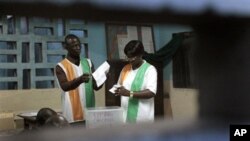Ivory Coast's Constitutional Court has overruled the challenges from last Sunday's presidential poll and set the second round run-off between President Laurent Gbagbo and former prime minister, Alassane Ouattara, for November 21st.
Ivorians went to the polls October 31st for the country's first presidential poll in a decade.
Speaking on state television Saturday evening, Constitutional Court president Paul Yao N'Dre said no candidate won an outright majority, so the two front-runners must proceed to a run-off election 15 days from this announcement, as law requires. Those two candidates, he says, are President Laurent Gbagbo, who won 38 percent of votes, and former prime minister Alassane Ouattara, who won 32 percent.
The challenges to provisional results had been brought by opposition leaders, who had publicly called for a recount Saturday.
The campaign for both remaining candidates now focuses on winning over the 25-percent share of the electorate that backed third-place candidate, former president Henri Konan Bedie.
Before the vote, Ouattara and Bedie had pledged mutual support in the event of a runoff. Still, President Gbagbo may be able to attract Bedie voters who are uncomfortable with Ouattara, who was prevented from running for president in the past because of questions about his nationality.
The presidential election is meant to reunite Ivory Coast after a 2002-2003 civil war and end more than a decade of political instability.
There were concerns that disagreements over the results of the poll would reignite violence, but the election has so far been peaceful.
Constitutional court president Yao N'Dre congratulated Ivorians on a successful vote and praised the conduct of the first-round's 14 candidates during the electoral process.
Yao N'Dre urges the two remaining candidates to continue to carry out civilized campaigns and work to ensure that voting is calm and the results of the second round will be accepted peacefully.
Yao N'Dre also issued recommendations for the run-off vote on November 21st that included making sure every polling station has sufficient voting materials. He urged the polling staff to correctly fill out forms that report each polling station's vote tallies to the Central Electoral Commission on election night.
Voter turnout was high on the first round of election with more than 80 percent of the country's 5.7 million registered voters going to the polls.
Despite organizational challenges, international observers did not report evidence of fraud and deemed the poll credible.
